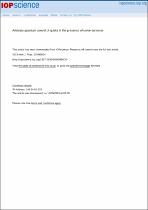JavaScript is disabled for your browser. Some features of this site may not work without it.
- ResearchSpace
- →
- Research Publications/Outputs
- →
- Journal Articles
- →
- View Item
| dc.contributor.author |
Green, TJ

|
|
| dc.contributor.author |
Sastrawan, J

|
|
| dc.contributor.author |
Uys, H

|
|
| dc.contributor.author |
Biercuk, MJ

|
|
| dc.date.accessioned | 2014-01-24T10:14:42Z | |
| dc.date.available | 2014-01-24T10:14:42Z | |
| dc.date.issued | 2013-09 | |
| dc.identifier.citation | Green, T.J, Sastrawan, J, Uys, H and Biercuk, M.J. 2013. Arbitrary quantum control of qubits in the presence of universal noise. New Journal of Physics, vol. 15(9), p 095004 | en_US |
| dc.identifier.issn | 1367-2630 | |
| dc.identifier.uri | http://iopscience.iop.org/1367-2630/15/9/095004/pdf/1367-2630_15_9_095004.pdf | |
| dc.identifier.uri | http://hdl.handle.net/10204/7178 | |
| dc.description | Copyrigth: 2013 Institute of Physics. Ths is an OA journal. The journal authorizes the publication of the information herewith contained. Published in New Journal of Physics, vol. 15(9), pp 1-27 | en_US |
| dc.description.abstract | We address the problem of deriving analytic expressions for calculating universal decoherence-induced errors in qubits undergoing arbitrary, unitary, time-dependent quantum control protocols. We show that the fidelity of a control operation may be expressed in terms of experimentally relevant spectral characteristics of the noise and of the control, over all Cartesian directions. We formulate control matrices in the time domain to capture the effects of piecewise-constant control, and convert them to generalized Fourier-domain filter functions. These generalized filter functions may be derived for complex temporally modulated control protocols, accounting for susceptibility to rotations of the qubit state vector in three dimensions. Taken together, we show that this framework provides a computationally efficient means to calculate the effects of universal noise on arbitrary quantum control protocols, producing results comparable with those obtained via time-consuming simulations of Bloch vector evolution. As a concrete example, we apply our method to treating the problem of dynamical decoupling incorporating realistic control pulses of arbitrary duration or form, including the replacement of simple -pulses with complex dynamically corrected gates. | en_US |
| dc.language.iso | en | en_US |
| dc.publisher | Institute of Physics | en_US |
| dc.relation.ispartofseries | Workflow;11984 | |
| dc.subject | Quantum control | en_US |
| dc.subject | Dynamical decoupling sequences | en_US |
| dc.title | Arbitrary quantum control of qubits in the presence of universal noise | en_US |
| dc.type | Article | en_US |
| dc.identifier.apacitation | Green, T., Sastrawan, J., Uys, H., & Biercuk, M. (2013). Arbitrary quantum control of qubits in the presence of universal noise. http://hdl.handle.net/10204/7178 | en_ZA |
| dc.identifier.chicagocitation | Green, TJ, J Sastrawan, H Uys, and MJ Biercuk "Arbitrary quantum control of qubits in the presence of universal noise." (2013) http://hdl.handle.net/10204/7178 | en_ZA |
| dc.identifier.vancouvercitation | Green T, Sastrawan J, Uys H, Biercuk M. Arbitrary quantum control of qubits in the presence of universal noise. 2013; http://hdl.handle.net/10204/7178. | en_ZA |
| dc.identifier.ris | TY - Article AU - Green, TJ AU - Sastrawan, J AU - Uys, H AU - Biercuk, MJ AB - We address the problem of deriving analytic expressions for calculating universal decoherence-induced errors in qubits undergoing arbitrary, unitary, time-dependent quantum control protocols. We show that the fidelity of a control operation may be expressed in terms of experimentally relevant spectral characteristics of the noise and of the control, over all Cartesian directions. We formulate control matrices in the time domain to capture the effects of piecewise-constant control, and convert them to generalized Fourier-domain filter functions. These generalized filter functions may be derived for complex temporally modulated control protocols, accounting for susceptibility to rotations of the qubit state vector in three dimensions. Taken together, we show that this framework provides a computationally efficient means to calculate the effects of universal noise on arbitrary quantum control protocols, producing results comparable with those obtained via time-consuming simulations of Bloch vector evolution. As a concrete example, we apply our method to treating the problem of dynamical decoupling incorporating realistic control pulses of arbitrary duration or form, including the replacement of simple -pulses with complex dynamically corrected gates. DA - 2013-09 DB - ResearchSpace DP - CSIR KW - Quantum control KW - Dynamical decoupling sequences LK - https://researchspace.csir.co.za PY - 2013 SM - 1367-2630 T1 - Arbitrary quantum control of qubits in the presence of universal noise TI - Arbitrary quantum control of qubits in the presence of universal noise UR - http://hdl.handle.net/10204/7178 ER - | en_ZA |






